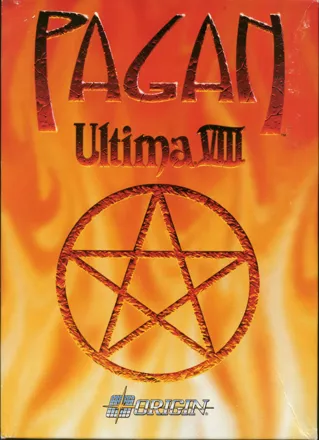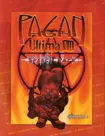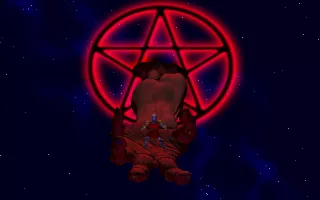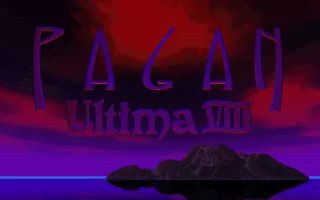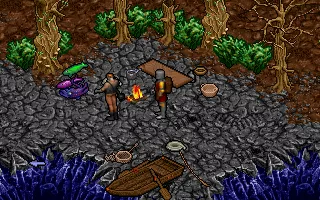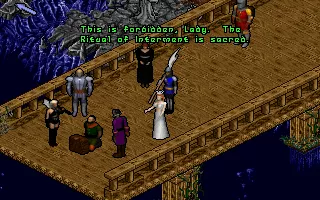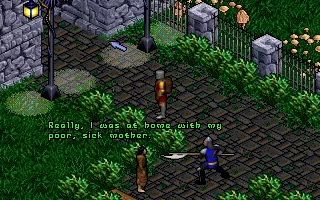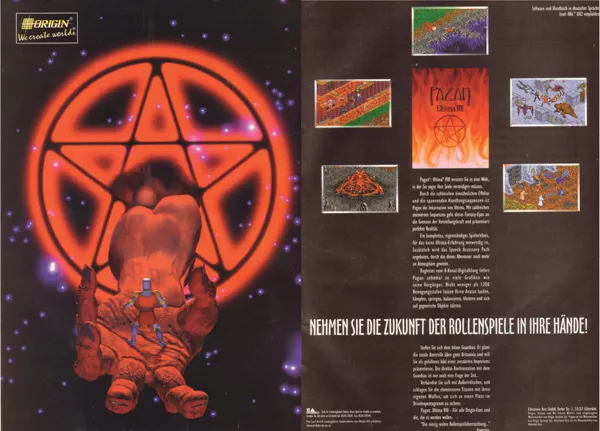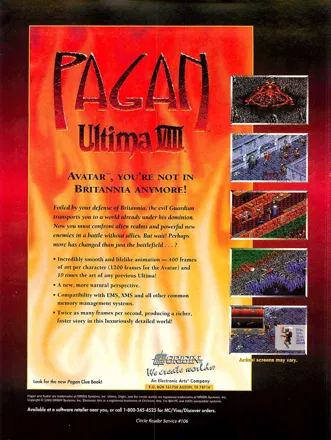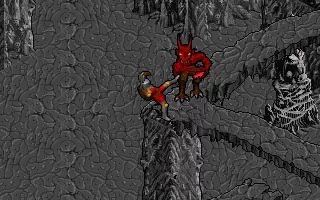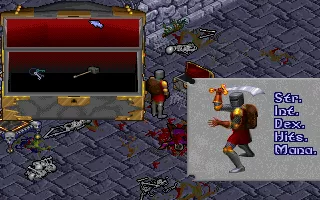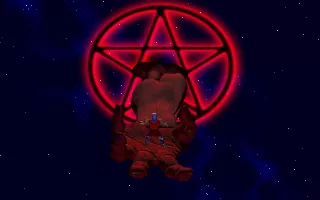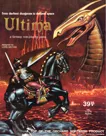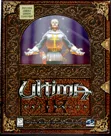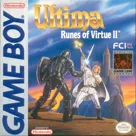Pagan: Ultima VIII
-
 Pagan: Ultima VIII
(1994 on
DOS, 1995 on
PC-98, 2012 on
Windows)
Pagan: Ultima VIII
(1994 on
DOS, 1995 on
PC-98, 2012 on
Windows)
Description official descriptions
Ultima VIII: Pagan begins where Ultima VII: Part Two - Serpent Isle ended. The Guardian banishes the Avatar to the land of Pagan, a world under his control. Stranded in this unknown land, without his companions to help him, the Avatar's goal is to find a way back to Britannia. He has to confront four Titans in this world who are embodiments of the four elements, as well as master different styles of magic and fight many opponents on his way.
The gameplay is significantly more action-oriented in this installment than in the previous Ultima games. The Avatar is able to jump and climb, and some puzzles are based on these abilities, adding platform-style elements to the game. There are no companions to help him in battles; combat is action-based and relies on the player's dexterity. The game also abandons the leveling system of the previous entries, utilizing instead a training-based approach, similar to the one implemented in Quest for Glory games: the character's parameters are increased by continuously using correspondent actions (e.g. the Avatar's strength gradually increases as he swings his weapon).
Magic occupies an important place in the game, also departing from the style of the preceding games. The player still needs to gather reagents for spells; however, the exact preparation and casting of the spell differs depending on the elemental school it belongs to. There are four different magic schools in the game, and mastering their spells bears plot-related importance as well.
Like in the two previous Ultima installments, the game features physical interactivity with the environment: the player is able to take, drop, and move most objects from place to place. As opposed to the topic-based dialogue style of the earlier games in the series, Pagan uses conversations with selectable responses. It also reduces NPC interaction, focusing more on exploration of a hostile world and combat.
A speech pack was released separately, which added voices to some of the major game characters. It was included in the CD-ROM edition of the game.
Spellings
- Ultima VIII: פגאן - Hebrew spelling
Groups +
Screenshots
Promos
Credits (DOS version)
60 People · View all
| Producer | |
| Director | |
| General Manager | |
| Game Design | |
| Lead Programming | |
| Programming Team | |
| Graphics Team | |
| Writing Team | |
| [ full credits ] | |
Reviews
Critics
Average score: 81% (based on 19 ratings)
Players
Average score: 3.8 out of 5 (based on 80 ratings with 9 reviews)
If it ain't broke, don't fix it.
The Good
*2nd update. Minor changes, hated the last One-line Summary.
When I say this, I probably would speak for all Ultima fans: WE DID NOT EXPECT THIS. Which isn't really a problem, only that statement was meant in a bad way. But, I'll explain that in the "didn't like part".
Actually the game isn't bad really, quite good actually although I never thought in my worst nightmares that Ultima would actually have an action version...aaaaaaaah!
Anyway, better graphics, better sound, more complex, more everything. The key here is realism...they made a good job out of that (although the Ultima fans might disagree...I'm one of them).
I must admit though, that the combat is very much entertaining. Not much strategy in the combat though, just click-click-click. The magic is more complex, more variations. Pagan has more variations and is more complex than its ancestors in addition to much detailed animations.
The Bad
Although personally I like the game, I am obligated as a hardcore Ultima fan to say this: OH MY GOD! OH MY GOD! OH MY GOD! WHAT HAVE THOU DONE?" (Repeat as many times as possible) - which is basically the essence of all the other reviews...
Change is usually good. No one is really against change, especially when it comes to Ultima. They made a brilliant change from Ultima V to Ultima VI. Now, they tried challenge tradition again. But this time at least to my opinion.
They really did a good job in making Ultima Pagan, but they failed big time in the most important things. They failed the fans and they failed the Avatar.
Everyone loved the Ultima VI-VII game engine. We were used to it and we still weren't bored of it. We loved the story, we loved the characters in the game, we loved the ideals and morals in the game...and they took it all away with this new concept.
I have never "felt" so alone and lonely playing a Ultima game. I always thought that you'd be stuck forever with Iolo, Shamino and Dupre...even if it reached Ultima 100. The game is playable, but I probably experienced a "gaming cultural shock". I experienced the same thing while playing Ultima VII...knowing Merry the Mouse couldn't join the party. Well, now they've totally screwed it by eliminating all team members.
This would be a great game if it was a standalone. But it's not. It's part of the Ultima Series, the Legend...and they ruined the legend - The Avatar without a Soul. Now I'm really depressed. :p
Now combat was a major dissapointment for any RPG fan. Probably because the combat DOESN'T EXIST! Combat like I said in this game is - Click, Click, Click. Who thought of THAT incredibly stupid idea. No strategy whatsoever. Every monster you see is "click'em" to death. If only there were a "block or parry" button with it...
The Bottom Line
ULTIMATE CULTURE SHOCK (valid only for hardcore Ultima fans). A great game really, especially if your not familiar with Ultima.
DOS · by Indra was here (20750) · 2004
The Avatar loses his virtues as he goes the route of action hero.
The Good
Unlike most games in the Ultima series, Pagan has less going for it than against it. The graphics are crisp, clean, and pretty (although one can easily lose items behind walls due to the isometric perspective). They convey the world around your character in an adequate manner, if sometimes a little too bright and colorful. The rich sound and music tradition from Ultima VII continues on here and the little voice acting in the game is done well (most noteably the ever ominous Guardian). For those who like the recent game Nox, or would like an action-oriented role-playing game that has a little more depth than Diablo, this game may very well suit their needs.
The Bad
Often called the worst addition to the Ultima series, this game's biggest faults lie in breaking the status quo. In terms of gameplay, Origin decided to take the game down a more action-oriented path, resulting in what was (although not appreciated as such at the time) a predecessor to Diablo and Nox. Countless jumping episodes and other arcade-related activities frustrated RPG fans, especially since the interface wasn't the most user-friendly.
Worse than the decision to go with action is the deviation in story/content. In the continuing trend of lessening the personalization of the Avatar, in this game you are forced to play a male, bucket-helmeted Avatar, making the character more and more distant in many people's mind. The Avatar himself no longer seems to be the Avatar. This 'paragon of virtue' who strove to be honest, humble, compassionate, etc in the previous four Ultimas suddenly has no qualms about lying, stealing, and murdering (to the apparent point of genocide). There are no ways around these plot points as there were in the past. The evil choice isn't just the easy way...it's the only way. The plot is fairly linear and although the hand-holding is fitting considering you're stuck in a land run by the Guardian, it, along with the action, tends to make people feel like their playing some scrolling jumper game (ala Super Mario Brothers) rather than a RPG.
The characters and world in this installment lack the interest, appeal, or fascination of the people and places in the earlier chapters. I never realized how much the character portraits from U6 & U7 added to the personality of the character. Here, the characters all look little wooden artist models with clothes on. Lacking in any feelings for them, I began to lose my digust over the Avatar's behavior. Much like he, I started to not care. I just wanted to get it all done with.
The Bottom Line
Ultima VIII: 'Super Avatar Brothers' is the low point for both the Avatar and the series. Origin took a shot on redefining 'role playing games' and, while in retrospect helped define a genre later perfected by Diablo and Nox, it was a disaster. It was too actiony for long term fans and too complex for simple action fans. The main character, once the epitome of a virtuous hero, throws it all aside in an attempt to escape from world totally under the control of his arch-nemesis. The clean and colorful graphics give life to the world, though the faceless clones may remind one of Ultima Online. The game appeals in its attempt to convey being a prisoner in a world without bars, but the Avatar's contempt for rules and 'good behavior' remove any real concern for him.
DOS · by Ray Soderlund (3501) · 2000
Meet the action RPG colossus of its era
The Good
Pagan is the most controversial Ultima game, and is regarded by many fans as the lowest point of the series. The nickname "Super Mario Avatar" says it all. As soon as the game was released, accusations began to gush from sides: the jumping is ridiculous; my Avatar doesn't behave like an Avatar any more; this isn't real role-playing; Iolo, Shamino, and Dupre aren't there; Lord British, what hast thou done, etc.
Now, I can't deny that the change in gameplay compared to the previous entry in the series was perhaps too drastic to even justify the game's inclusion in it. That by itself, however, means only that Pagan has a strong chance of being considered a weak sequel. It doesn't speak for or against the actual game - it all depends on whether its new gameplay system is good or not. And it's very good, indeed.
The dissimilarity to earlier Ultimas and the ensuing rage of the fans prevented us from recognizing the game's undeniable significance. In retrospect, it becomes clear that Pagan was one of the founding fathers of modern action role-playing. Action RPGs had existed before - Falcom developed a whole sub-kind in Japan, and there were several examples in the West as well. But none of them came close to the rough, almost visceral treatment of Pagan. Action became an inseparable part of navigation and challenge, a key modifier that made the connection between the player and the protagonist closer than ever before - except, naturally, in the revolutionary Ultima Underworld games. In the realm of 2D games, however, that was an unsurpassed achievement: before Diablo conquered the world with its mad hack-and-slash, Pagan already delivered a serious action RPG formula that was in many ways deeper and more versatile.
I consider the addition of jumping and climbing a noteworthy enhancement of game mechanics. Most people ridiculed those new features. Maybe they could have been better executed (the Avatar is very clumsy, perhaps deliberately so), but the addition of physical interaction with the environment is a very important element. It creates a whole new dimension next to the already amazing interaction possibilities Ultima series has been offering in their later installments.
In Pagan, you can do even more things than before! It doesn't look this way because there aren't as many items and people in this game as there were in previous Ultimas, but the fact is that all the great interaction we were used to is still there - it wasn't "replaced" by jumping and climbing. You can still pick up any item you want and place it wherever you want. There are still a lot of things which are "just there", which you can examine and manipulate the way you like. And now fancy being able to climb on top of any building, or imagine how much more realistically treacherous dungeon navigation becomes when you are bound by physical laws.
The game's world is indeed smaller than in any previous Ultima and may seem monotonous, but it's still rich and detailed. There is a quite a bit of exploration to do in the game - Pagan is full of mysterious, dark locations, some of which are not necessary to visit in order to complete the game, like Pit of Death or the huge Slayer Dungeon. The flora of the game is unique (unlike the somewhat ordinary fauna - we've seen enough skeletons and trolls before), and the overall appearance is very original and stylish. This leads to another significant contribution of Pagan to the series - atmospheric immersion.
Pure, sensual atmosphere was not really important in Ultima games. Crafting detailed environments and abundance of items and creatures was more important than trying to actually express the serene beauty of hills, mountains, and rivers, or reflect the horrors of a dungeon. Not so in Pagan. The moment you start the game you realize you are in a bizarre, hostile world. The game is romantically dark and threatening, its stylish design including such strange and expressive things as deep, unnaturally dark blue water, or huge mushrooms growing everywhere. The technical quality of the graphics (which is clearly superior to than of the two previous Ultimas), is not the only reason for that. The designers tried to show maximum contrast between Britannia and Pagan, and they succeeded by creating a new original world.
The storyline of Pagan also appears to be simple and straightforward at first, but think of all the extensive background information we get in the game! In order to fully understand and enjoy this story it is necessary to listen carefully to what the characters tell you, and read books that are scattered all over the game. Thankfully, there are plenty of books in Pagan, ranging from simple magical instructions to detailed history of the world's culture.
Spellcasting in Pagan is deeper than entire gameplay systems of some other games. In order to flee from the unfriendly world you must become proficient in three kinds of magic - Necromancy, Theurgy, and Sorcery. Each one of the three types is unique, having its own spells and casting technique. Earth magic is the closest to the standard Ultima system: you mix reagents and prepare expendable spells. In order to be able to cast air spells, you must make foci out of silver ore, which then become extremely powerful magical spell-containing items of infinite charge. Fire magic system (Sorcery) is the most complex one. You put red and black candles at the corners of a pentagram, place required reagents near the candles, and then focus the spell on objects such as wand, rod, etc. Upon successful preparation of the spell, those objects become magically enchanted, allowing you to cast a limited amount of the spells they hold. Mastering fire magic is very difficult, but quite rewarding.
The Bad
So what is really wrong with Pagan? Not much if we see it as a standalone game; a lot if we recognize the legacy it claims to belong to. Almost every fan of the series will tell you the same thing: Pagan may be great in what it's trying to do, but it's not a true Ultima game.
Most of the game's flaws, therefore, become glaring only in the light of comparison. For example, an atmospheric dungeon crawler would probably work regardless of how many friendly NPCs it has and what they tell you. But when we compare Pagan to the magnificent worlds of earlier Ultimas, we begin to see the difference. The interaction with its citizens is noticeably more scarce; most people won't talk to you at all or say a few rude words. You will rarely see people on the streets, except professionals like guards and beggars in Tenebrae or various kinds of magicians in other places. There is no day and night cycle. Even a minor detail such as the absence of character portraits contributes to unpleasant coldness.
Pagan is also too small for an Ultima world. There is only one real city in the whole game, the rest of the settlements being tiny enclaves of necromancers and sorcerers. A very large portion of the game is occupied by a gigantic dungeon, the Catacombs, which is the only way to reach the key locations you'll have to access. The constant crawling through grim caves can get tiresome after a while.
The new "Super Mario Avatar" gameplay is not flawlessly executed, either. Before you bash it for being difficult and lacking grace, remember that - despite the derogatory nickname - it was never intended to mimic fast-paced platform games. That said, be sure to play the patched version of the game, because the Avatar is clumsy and hard to manipulate beyond any justification in the original release. Even in their post-patch state, controls can feel awkward and counter-intuitive. Sometimes you press down both mouse buttons four-five times in a row until our hero finally decides whether he wants to jump, climb, or just stand there, shaking his horned-helmeted head. Many times I was attacked by ghouls or skeletons from behind, but it took me several attempts to position myself properly and start teaching them lessons. If you miss the proper angle by an inch, the Avatar will begin to hit the air repeatedly, stupidly turning his back to the foe and moaning loudly whenever he gets hit.
Finally, Pagan lacks connection to the series' lore and abandons many concepts we loved and cherished in the previous installments. The word "Avatar", in particular, became nothing more but an empty formula, a kind of an abstraction that can be filled with any possible meaning. If a newcomer to the series were exposed to this iteration only, he would invariably conclude that an Avatar is a fairly brutal, rugged warrior whose main joy consists of angering powerful supernatural creatures and wreaking havoc in foreign lands.
The Bottom Line
As an Ultima game, Pagan is too atypical, delivering a "cultural shock" to the series' passionate fans. But taken separately, it is a rich and important game that did a lot of things we either take for granted now or don't even dare to demand any more. You can whine all you want about the Avatar losing his humility, but that does not change the fact that Pagan is a great action RPG ahead of its time.
DOS · by Unicorn Lynx (181746) · 2014
Discussion
| Subject | By | Date |
|---|---|---|
| Any Western action RPGs before this one? | Unicorn Lynx (181746) | Sep 9, 2014 |
Trivia
Cancelled add-on
The planned add-on The Lost Vale was all but finished and ready for duplication before it was cancelled in September 1994 due to poor sales of the main game. In September 2005, a prototype of the game box appeared on eBay and was sold for almost 2000 dollars. Its authenticity was confirmed by Origin artist Denis Loubet. More information on The Lost Vale, including a scan of the box, is available at PC Games That Weren't.
Engine
The Pagan game engine was recycled in Origin's Crusader series.
Pentagram
Richard Garriot used pentagrams as gameplay element because he thought the superstitions - many people believe pentagrams summon the devil - are ridiculous. During development, a few people actually left Origin because of this. After that, Garriot used the pentagram on the cover which caused some US retailers like Walmart to refuse carrying the game.
Plot
In the previous games, Avatar is rated mainly on compassion and doing good deeds. In Ultima VIII, the Avatar must turn all four planes of existence upside down by destroying the Titans of each plane, in order to escape. Many fans believed that this storyline ran counter to the spirit of the Avatar and the entire Ultima series.
Reception
Pagan was not well-received by long-time Ultima fans. A large number of them ridiculed the action and platform elements of the game, dubbing it "Super Avatar Brothers". The alternate nickname this game was known by is "Super Mario Avatar". Only a different wording, but still making a point about the gameplay and jumping puzzles.
Richard Garriott, the producer of this game, admitted himself that it was released too early, incomplete and with too many bugs. The patch Origin released soon afterwards corrected most of the issues and made jumping easier. The CD ROM release is already patched.
References
- Like Ultima VII, the game contains a reference hinting at the mighty corporate power of Electronic Arts. In Mythran's abode, a magical, morphing object appears, which continuously changes shape between cube, sphere and tetrahedron, and labeled differently during each change. These are the items the former EA logo was made out of.
When double-clicking the item, the avatar kneel and says: "I have not the strength, nor the wisdom to master such power... but one day I shall!". Obviously, Richard Garriott was behind this. * Check out the graves on the graveyard - on one of them there is the following epitaph: "Here lies Arnold. Hasta la vista baby!" An obvious reference to the movie Terminator 2.
Release history
At least in Europe, there were two different releases of the CD-ROM edition (not counting the budget releases). The first one came in the same box as the floppy disk release, with a "CD-ROM" sticker added to distinguish it from the floppy-based version. It included the speech pack, but was the same otherwise.
The second version had a redesigned box and was released in 1995. Unlike the first CD-ROM edition, this one was fully patched to fix all the bugs and plot holes that the game originally had.
Titans
The names of the four Titans are Greek words, that correspond to the elements the Titans represent: * Pyros (fire) * Lithos (earth) * Stratos (air) * Hydros (water)
Tumbling Avatar
In the original release of Ultima VIII there was the feature, that the Avatar, when hit hard in combat, fell on his back and had to get to his feet again before he could continue fighting. They later removed this in the patched version because players considered this very annoying. But you can still watch this feature when fighting a creature named Changeling. If the Changeling has taken the shape of the player and so you are fighting "yourself", the false Avatar will still fall on his back when he gets hit.
Awards
- Computer Gaming World
- November 1996 (15th anniversary issue) – #20 Worst Game of All Time
Information also contributed by Kasey Chang, Sciere, Terok Nor, Unicorn Lynx, WildKard, WindowsKIller and xcom1602
Analytics
Upgrade to MobyPro to view research rankings!
Related Sites +
-
Ganesh's Website - Planescape Torment, Ultima 7/8/UW1/UW2 & Jokes!
Walkthroughs, tips, hints, cheats, trainers, backgrounds, wallpapers, desktop themes, music, mp3s, midi, hand-picked *very* funny jokes and much MUCH more! -
How to be a Complete Bastard in Pagan
A website offering a humorous walkthrough to Ultima VIII that exploits as many bugs/loopholes in the game as possible. -
Pentagram
Should you have an original copy of "Ultima VIII: Pagan" you can use the Pentagram engine to run it on modern systems. -
Ultima 8 in Windows
Ron Windeyer's Web Page includes everything you'd need to do to play Pagan in Windows95/98/ME/2000
Identifiers +
Contribute
Are you familiar with this game? Help document and preserve this entry in video game history! If your contribution is approved, you will earn points and be credited as a contributor.
Contributors to this Entry
Game added by Terok Nor.
Additional contributors: Trixter, Ye Olde Infocomme Shoppe, G. Ganesh, Jeanne, Apogee IV, Pseudo_Intellectual, Crawly, phorque, Patrick Bregger.
Game added January 11, 2000. Last modified April 4, 2024.
